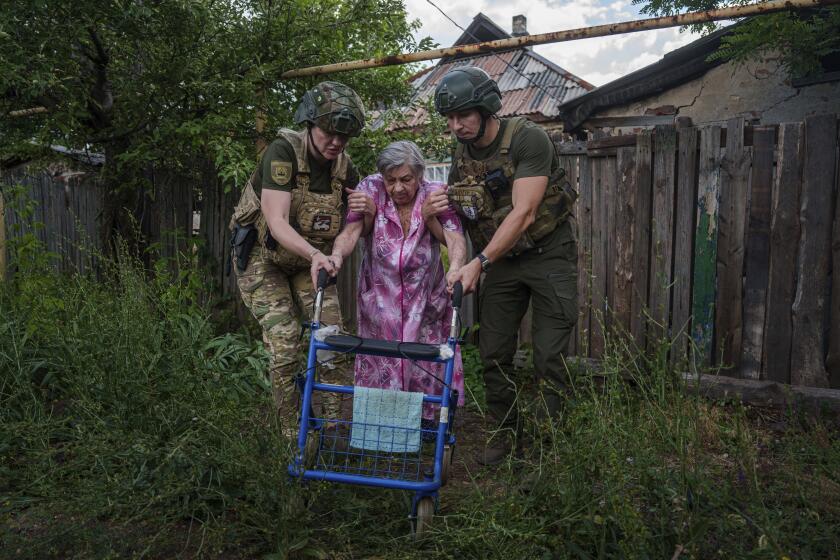Ex-Nazi Barbie Is Sentenced to Life : Guilty of ‘Crimes Against Humanity,’ He Shows No Emotion in French Court
Klaus Barbie, once the most feared Nazi in Lyon, was convicted and sentenced to life imprisonment early today for a series of “crimes against humanity” committed when he was the German Gestapo chief here in 1943 and 1944.
With head slightly bowed, the 73-year-old Barbie showed no sign of emotion as he listened intently to an interpreter relay the verdict from Presiding Judge Andre Cerdini. The French court of three judges and nine jurors, by the required majority of “at least eight votes out of 12,” had found him guilty of all charges.
For half an hour, Barbie, his eyes sunken and darkened, then listened to the judge read the list of his crimes--almost all involving the arrest and deportation of several hundred Jews and members of the French Resistance movement to Nazi extermination camps.
Verdict Applauded
Spectators in the packed courtroom broke into applause when they heard the life sentence, the maximum penalty under French law, and they were soon joined by cheers from several hundred people who had been waiting outside the Palace of Justice for news of the verdict.
Defense attorney Jacques Verges gestured contemptuously at the applauders. Spectators whistled, booed and spat on Verges as he was led from the courtroom surrounded by scores of police. Officers with batons charged the crowd outside, and Verges was forced to return to the courtroom until police drove the demonstrators away.
Serge Klarsfeld, a French Jewish lawyer who had helped his German-born wife, Beate, track down Barbie in his one-time haven in Bolivia, was quick to express his satisfaction at the verdict and sentence.
Klarsfeld, who took part in the trial as a private lawyer for the families of 44 children rounded up by the Gestapo from a camp in the village of Izieu and deported to the gas chambers of Auschwitz, said the verdict means “the children of Izieu will not die, and for me, that’s a satisfaction.”
‘No Banalization’
“The French people do not forget,” he went on. “They have condemned all the crimes committed by the Nazis. There has been no banalization.”
His use of that expression reflected a fear by many French intellectuals that the arguments in the trial might succeed in belittling the horror of the Nazi “final solution” of exterminating Jews.
Verdict in Six Hours
The panel of judges and jurors took six hours to reach their verdict. They came back to the courtroom shortly after midnight.
In a dramatic moment before the case reached the jury late Friday afternoon, a manacled Barbie, who had refused to attend almost every session of the trial, was led by police into the courtroom. Judge Cerdini had ruled that Barbie would be forced to attend to make a final statement if he chose and to hear the verdict.
Barbie, looking gaunt, did not hesitate to speak, and it was soon clear that the most heart-rending accusation against him, the roundup of the Jewish children from Izieu on April 6, 1944, was most on his mind.
Asked if he had a final statement to make in his defense, Barbie replied, speaking softly and slowly: “Yes, I have a few words to say in French. I did not order the roundup of Izieu. I never had the power to decide about deportations.
‘The War Is Over’
“I fought the Resistance, which I respected, in a hard manner,” he went on. “But that was the war, and the war is over.”
In his final argument, Verges, a histrionic and iconoclastic lawyer, described Barbie as a scapegoat for all the crimes of Nazism and asserted that the case against him was flimsy, based on contradictory testimony, confusing assumptions, and questionable documents. He spent a good deal of time Friday denouncing as a forgery a telex message signed by Barbie that reported the Izieu roundup to German headquarters in Paris.
Later, after the verdict, Klarsfeld, who had uncovered the telex, told reporters, “After four years of Verges accusing me of being a forger and a manipulator, the French people have decided who is guilty, Barbie or me.”
In his defense summation, Verges said that Barbie was not even in Lyon at the time the telex was sent and that the prosecution had taken the attitude that “since Hitler is guilty, Barbie must be guilty, of no matter what.”
But the 62-year-old Verges, who has made a career of defending unpopular causes, also seemed to enjoy mocking the private, mostly Jewish lawyers who, as authorized under French law, represented the victims and their families at the trial.
Upset the Lawyers
Arguing that Barbie, despite his role as chief of the Gestapo in Lyon, would not have known about the extermination of the Jews, Verges obviously upset the lawyers by insisting that Adolf Hitler had not planned extremely harsh measures against Jews until his views on “the Jewish problem” were radicalized during World War II.
A couple of days earlier, they had objected when an associate of Verges, Algerian lawyer Nabil Bouaita, charged that Israeli aggression against the Third World was as bad as the Nazi extermination of the Jews and that there was no difference between a phosphate bomb and a Nazi crematorium.
Aside from ordering the raid on the children’s camp in Izieu, Barbie was convicted on three other counts:
-- Ordering a roundup of Jews at the headquarters of the General Union of Israelites in France on Feb. 9, 1943, and deporting 84 to extermination camps.
-- Ordering the last train convoy to leave Lyon on Aug. 11, 1944, with 651 Jewish and Resistance prisoners for concentration and extermination camps.
-- Taking part in the arrest, torture and deportation of a large number of individual Jews and members of the French Resistance in World War II.
Torture, Beatings Told
In some of the most chilling testimony at the trial, several women of the Resistance testified that Barbie himself had beaten and tortured them.
For Barbie, the verdict was the climax of a strange odyssey. He had led the Gestapo in Lyon from late 1942 until 1944, when the city was liberated from the German occupation.
During this period, he was known as “the Butcher of Lyon” and cut an unsavory place for himself in French history by arresting Jean Moulin, one of the great heroes of the Resistance. Moulin, who is now buried in the Pantheon in Paris, died after being tortured while in Nazi prisons, and most French blame Barbie for the killing.
After the war, Barbie evaded French justice by working for U.S. Army intelligence in the American zone of Germany. The Americans, using him as a supplier of information about Communists, shielded him from the French.
When the French came too close, demanding his extradition, the Americans provided Barbie with the alias Klaus Altmann and sent him to a refuge in Bolivia in 1951.
Barbie’s Boast on TV
Barbie’s haven was uncovered by Beate Klarsfeld in 1972. But Barbie continued to live with impunity as a businessman and police adviser to the Bolivian government for almost a decade. He even boasted on French television that the French government would never try to get him back because he had too many stories to tell.
In 1983, however, with a new leftist government in power in Bolivia and a Socialist government in power in France, the Bolivians expelled him to French authorities in French Guiana in South America. He was then moved to Lyon to await trial four years later.
There were a great many fears then that any trial of Barbie would turn into a trial of France itself. Moulin, for example, would never have been captured if a French collaborator had not betrayed him to Barbie.
But the fears soon lessened. For one thing, the courts ruled that crimes like the torture and killing of Moulin were war crimes for which the statute of limitations had run out.
Moreover, Barbie had been tried in absentia by French military courts in 1952 and again in 1954, and he was convicted and condemned to death. According to French law, the long delay in carrying out the sentences meant that he could neither be tried for the same crimes again nor forced to serve any kind of sentence.
Legal Obstacles
To get around these legal obstacles, French prosecutors decided to try him for “crimes against humanity,” crimes regarded as so heinous that there is no time limit for trial. A law covering such crimes was passed by the French National Assembly in 1964.
Discussion of such crimes turned out to be less embarrassing for France than a trial about the murder of Jean Moulin. Embarrassment was also avoided by Barbie’s refusal to attend almost all the sessions of the trial. He insisted that he had done this to protest what he regarded as his illegal expulsion from Bolivia. But his absences meant that there was almost no opportunity for him to say anything that might embarrass a French collaborator.
During the trial, however, new charges were filed against Barbie, accusing him of “crimes against humanity” for allegedly murdering two Resistance fighters captured with Moulin. If that case ever comes to trial, it might prove more uncomfortable for some parts of Lyon society than the trial that ended early today after almost eight weeks.
More to Read
Start your day right
Sign up for Essential California for news, features and recommendations from the L.A. Times and beyond in your inbox six days a week.
You may occasionally receive promotional content from the Los Angeles Times.






